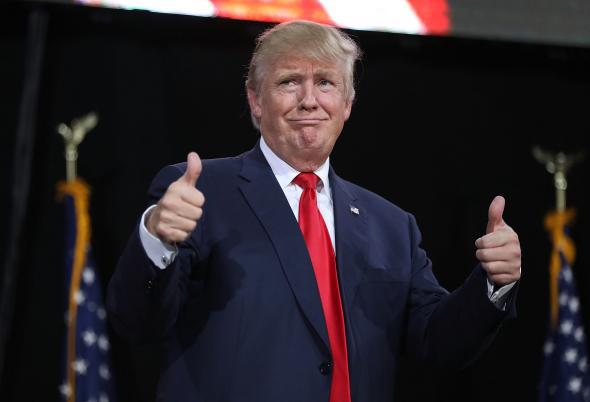Republican presidential candidate Donald Trump and his supporters like to claim that his business practices reveal his smarts. After the New York Times published a portion of his 1995 taxes in early October, showing he claimed a $916 million loss, surrogates like Rudy Giuliani and Chris Christie immediately proclaimed him a “genius.” “There are not very many smart businessmen who don’t take advantage of the legal tax laws that are there. And if they are, then they are not very good businessmen,” Giuliani argued.
Now, thanks to the latest investigation of Trump’s taxes by the New York Times, our portrait of Trump as a taxpayer is a little bit clearer: He isn’t just a businessman who’s so brilliant he managed to lose, either outright or on paper, close to $1 billion. He’s also one who tried to push the law to its limits—and perhaps past them—to avoid paying the tax man.
We don’t know how successful Trump was at making good on this scheme, since the candidate has refused to release his tax returns (an unprecedented and dangerous violation of election norms that Adam Chodorow lamented in Slate this week). What we do know: Every time there is a new revelation about Trump’s relationship with the IRS, it looks more and more troublesome. And this one reveals a shocking brazenness.
In the early 1990s, Trump convinced financial organizations that loaned him money to build a casino empire in Atlantic City to forgive debt he almost certainly could not repay. The banks and bondholders went along not because they were enamored with Trump’s supposed business savvy but because of the epic scale of his failures. They had loaned him so much money in the past for his misbegotten enterprises that they needed to keep him afloat in hopes of getting something back.
Digging into Trump’s casino bankruptcy filings, the Times found that Trump might have been able to claim the previously reported $916 million loss by using a controversial tax ploy that was ultimately banned by Congress.
Generally, the Internal Revenue Service counts forgiven debt as income and demands the recipient of this largesse pay taxes on it as such. This appeared to present a problem for Trump, because, as the Times reports, he was down to a few million in his personal accounts at one point in the early 1990s. Trump apparently turned to a controversial strategy called a “stock-for-debt swap.” Essentially, debt is swapped for stocks, and it appears—at least on the ledger sheet—that the money was repaid, even if the swapped stock couldn’t possibly be worth the value of the debt. The IRS aggressively questioned its usage and Congress officially banned its use by corporations in 1993.
Trump, however, owned his casinos through partnerships, not corporations, and he apparently turned to this strategy before the initial congressional action. Nonetheless, Trump was living dangerously. Letters from his tax attorneys obtained by the Times opined—in legalese, mind you—that his particular use of the maneuver was likely difficult to pull off. “Substantial uncertainties exist,” one missive warned. That’s lawyer for Don’t do this. Please. Stop now.
But Trump tried to do it anyway.
What happened next? Well, we would likely know the answer to that if Trump would release his taxes. He won’t. All we can say is that Trump did appear to indicate while debating Hillary Clinton that he didn’t pay personal federal income taxes for at least some period of time, saying, “that makes me smart.” And when attacked at the last presidential debate for his iffy tax behavior, Trump blamed Hillary Clinton for not shutting him down. “If you don’t like what I did, you should’ve changed the laws,” he said.
Well, that turned out to be yet another Trump statement that could charitably be described as disingenuous. In the 1990s, Hillary Clinton could do nothing. She was first lady. But as the Times reported, in 2004 then-Sen. Hillary Clinton did indeed vote yes on a congressional effort to shut the partnership loophole that Trump tried to utilize to avoid paying his taxes. It passed.
Will this latest bit of financial sleaze make any difference to Trump’s supporters? Oh, come on. They almost certainly get that he’s a fraud by now. Maybe they think he’ll use his less-than-ethical business behavior on their behalf. Maybe they don’t care in the slightest. What they still don’t seem to understand is that there is only one thing that concerns Donald Trump, and that’s Donald Trump.
